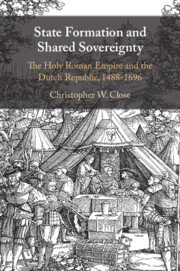Book contents
- State Formation and Shared Sovereignty
- State Formation and Shared Sovereignty
- Copyright page
- Contents
- Maps
- Acknowledgments
- Abbreviations
- Maps
- Introduction
- 1 The Swabian League and the Politics of Alliance (1488–1534)
- 2 Alliances and the Early Reformation (1526–1545)
- 3 Alliances and New Visions for the Empire and the Low Countries (1540–1556)
- 4 Shared Sovereignty and Regional Peace (1552–1567)
- 5 Shared Sovereignty and Multi-confessionality in the Empire and the Low Countries (1566–1609)
- 6 Religious Alliance and the Legacy of Past Leagues (1591–1613)
- 7 Religious Alliance and the Thirty Years’ War (1610–1632)
- 8 Westphalia and Politics of Alliance in the Empire and the Dutch Republic (1631–1696)
- Conclusion
- Bibliography
- Index
Introduction
Published online by Cambridge University Press: 02 March 2021
- State Formation and Shared Sovereignty
- State Formation and Shared Sovereignty
- Copyright page
- Contents
- Maps
- Acknowledgments
- Abbreviations
- Maps
- Introduction
- 1 The Swabian League and the Politics of Alliance (1488–1534)
- 2 Alliances and the Early Reformation (1526–1545)
- 3 Alliances and New Visions for the Empire and the Low Countries (1540–1556)
- 4 Shared Sovereignty and Regional Peace (1552–1567)
- 5 Shared Sovereignty and Multi-confessionality in the Empire and the Low Countries (1566–1609)
- 6 Religious Alliance and the Legacy of Past Leagues (1591–1613)
- 7 Religious Alliance and the Thirty Years’ War (1610–1632)
- 8 Westphalia and Politics of Alliance in the Empire and the Dutch Republic (1631–1696)
- Conclusion
- Bibliography
- Index
Summary
In May 1608, several Protestant rulers in the Holy Roman Empire convened an emergency summit in the Swabian town of Auhausen. Weeks earlier, they had walked out of the Imperial Diet, the Empire’s main legislative assembly, to protest what they deemed Catholic attempts to undermine the Empire’s constitution. Speaking in one voice, those gathered in Auhausen condemned their opponents’ “hostile and violent actions” as a threat to the Empire and its members, known as Imperial Estates. If left unchecked, rogue actors would “create one disturbance after another in the beloved Fatherland, thereby wreaking havoc with the entire ancient and praiseworthy imperial constitution. The result will be nothing less than the destruction of all good order, law, and prosperity.” Only by uniting “in a loyal understanding and association” could peace-loving authorities prevent this catastrophe. Accordingly, the Estates assembled in Auhausen formed an alliance, set to last for ten years, which became known as the Protestant Union.
- Type
- Chapter
- Information
- State Formation and Shared SovereigntyThe Holy Roman Empire and the Dutch Republic, 1488–1690, pp. 1 - 23Publisher: Cambridge University PressPrint publication year: 2021

